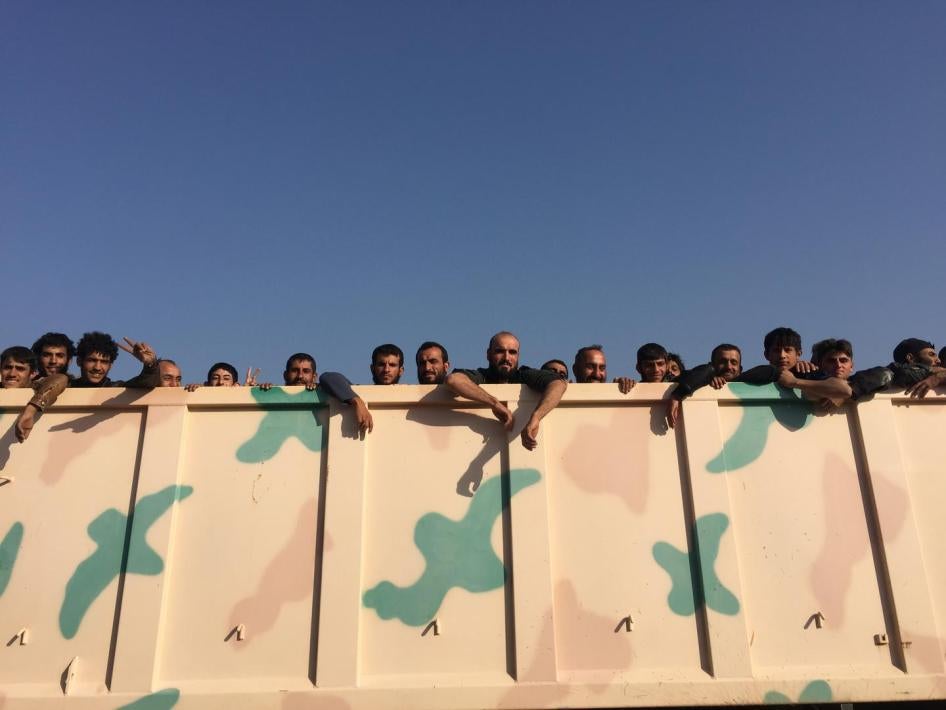In early October 2016, Human Rights Watch warned of the dire human rights consequences that could result if the Popular Mobilization Forces (known as the PMF or Hashd al-Sha'abi) participated in screenings of men and boys fleeing Mosul for suspected involvement with the Islamic State (also known as ISIS).
Given these groups’ lack of training in screening, the irregular nature of their screenings and detentions, and the detainees’ lack of contact with the outside world once in their custody, any men or boys detained as part of these screenings would be at heightened risk of abuse, including arbitrary detention and enforced disappearance. Indeed during the Falluja battle, we saw the horrific, indeed fatal, results of screenings and detention by the Popular Mobilization Forces
Before the battle for Mosul began, Prime Minister Haider al-Abadi made private commitments in meetings with diplomats that he would keep the PMF out of Mosul, and out of the screening process. But in February 2017, we found the PMF carrying out informal screenings of civilians fleeing the city, and in some cases detaining people on suspicion of ISIS-affiliation.
When our report came out about that, Prime Minister al-Abadi once again privately made a commitment to diplomats that this would stop immediately. But, we continue to see evidence of the PMF screening men and boys fleeing Mosul.
On March 12, 2017, I spoke to three men who had escaped the city on March 9 via a road leading west, out of the city. They said that their first encounter with Iraqi forces was an informal screening site run by 10 to 15 PMF fighters six kilometers down the road, at an abandoned quarry. Officers who identified themselves as members of the PMF, wearing PMF badges, sitting inside two mini-buses, took the men’s identity cards from the open side door and ran their names through the databases they had on a laptop and iPad, the men said. The PMF officers also used a masked “informant” to point out arrivals who allegedly had links to ISIS. The men said that they could tell from their accents that these PMF forces were from southern Iraq. They said the PMF officers detained several men at the screening site and that they saw the officers take the men away. No other Iraqi security forces were present, they said.
An observer at the same screening site on March 11, 2017 said that three PMF groups were there: Hezbollah Brigades, al-Abbas Brigades, and Imam Ali Battalions. The observer said a self-identified Imam Ali battalion officer detained one man, and asked the forces where the person would be taken. The observer got a range of responses.
An Imam Ali fighter said they had detained at least 10 men over the previous two days, and handed them all over to the Iraqi army. Two other officers, including one in control of the detainee at the time, said they would be transporting him straight to judicial authorities in Baghdad. A third man who identified himself as a representative of the Directorate of General Security said that the PMF handed any detainees over to his forces. The now defunct Directorate of General Security was an intelligence force under Saddam Hussein, and two experts in Baghdad told Human Rights Watch that they had not heard of such a body currently functioning.
The range of responses signals an utter lack of coordination, and raises serious concerns of where detainees are being held, by whom, and under what conditions and authority.
For its part, the PMF continues to publicly deny that it is conducting screenings in the Mosul operation. Following our report in February 2017, the PMF Commission issued a statement denying that their forces screened or detained anyone. They said that they hand over captured ISIS suspects to state security forces with a mandate to screen. But in a meeting on February 6, a PMF Commission representative admitted to us that in limited circumstances they do detain people captured on the battlefield for at least short periods before transferring them to authorities with a detention mandate. One man whom PMF had detained for eight days, and an aid worker, confirmed that.
In February 2017, a parliament member in Baghdad and the PMF Commission representative also said that not only was the PMF detaining people, but that it was taking them to Baghdad and before a PMF-dedicated judge. A spokesman for the High Judicial Council in Baghdad told us a year ago that there was a specialized PMF court established in late 2014 or early 2015 with a specific judge to try abuses committed by the PMF, akin to a military court. It would be a source of particular concern if the PMF are now taking men they capture, including civilians, before this body.
The PMF have no legal authority to detain anyone in Iraq, and Prime Minister al-Abadi should make it crystal clear to them and to the public that they should stop all screening and detention. Anyone responsible for unlawful detention should be prosecuted. Coalition partners supporting Iraqi forces in the battle against ISIS should report on any continued PMF screenings or detentions that their forces witness, and urge Baghdad to end the practice.










